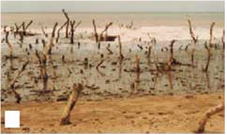Common Property Resources
Andhra Pradesh State of the Environment: A report from ENVIS
Posted on 11 Aug, 2009 04:00 PMThe Andhra Pradesh State of the Environment Report is available at the Environmental Information System (ENVIS) cell of the Ministry of Environment and Forests (MoEF) here.
Report of steering committee on drinking water supply and sanitation for tenth five year plan and report of working group on natural resource management and water resources for 11th five year plan
Posted on 02 Jun, 2009 02:29 PMReport of steering committee on drinking water supply and sanitation for tenth five year plan
Water to the people: drinking water and water for livelihoods - conflicts and alternative concepts in India – A report by Centre for World Solidarity (CWS) and Church Development Service (EED)
Posted on 30 Apr, 2009 12:21 PMThis study is a part of water and democracy programme initiated by the Centre for World Solidarity (CWS) as a joint initiative with Church Development Service (EED) in 2007 involving more than 50 partner organisations in South Asia.
Vacancy: GWP technical committee chair
Posted on 14 Apr, 2009 11:04 AMImage and Content Courtesy: Global Water Partnership  The Global Water Partnership Technical Committee provides intellectual leadership for the identification and understanding of critical emerging issues affecting water and s
The Global Water Partnership Technical Committee provides intellectual leadership for the identification and understanding of critical emerging issues affecting water and s
Oustees demand stoppage of Maheshwar dam in front of Environment Monitoring Committee
Posted on 11 Mar, 2009 08:48 AMThe oustees of Maheshwar Dam demanded immediate stoppage of Maheshwar dam in village during the visit of the Monitoring Committee constituted by the Ministry of Environment and Forest. The oustees told the Committee that the project authorities have completely failed to rehabilitate the oustees but the construction work is going on full pace. Therefore, as per the conditions of the clearance the dam work should be stopped.
The Monitoring Committee: It may be stated that on 1st May 2001, the Ministry of Environment and Forest transferred the statutory clearance regarding Maheshwar Project to the Shree Maheshwar Hydel Power Corporation Limited (SMHPCL), the company building the dam. As per this clearance a Monitoring Committee was constituted to ensure that the rehabilitation work should be carried out at the same pace of concreting. The Committee headed by Mrs. Nirmala Buch visited the area on 23rd and 24th of February,2009.
Athirappilly satyagraha crosses one year 25th Feb 2009
Posted on 26 Feb, 2009 11:06 AMDear Friends, We welcome you to support the cause of a dying river in the Western ghats As you are aware, an indefinite Satyagraha led by Chalakudy River Protection Forum has been going on at Athirappilly near the project site since 25th February 2008. A series of programs have been organized in connection with the first anniversary of the Satyagraha to remind the conscience of the society what is in store if we tamper too much with our rivers, the people's longstanding time tested resistance to an environmentally, socially and economically unjust and unviable hydro electric project planned in one of the most beautiful rivers in the Western Ghats, the only basis of survival of millions of people and what has to be the real solution to the energy crisis in Kerala.
Press Release by SANDRP: Why does our Govt have no value for rivers ?
Posted on 08 Jan, 2009 10:32 AMA two day National Workshop on need for policy and legal norms for allowing freshwater flows in Rivers in India on January 3-4, 2009 at Bangalore ended with a unanimous demand that governments must allow continuous, sustained freshwater flows in all perennial rivers of India, whenever, a dam, diversion or hydropower project is planned, constructed or operated. Inaugurating the workshop on the morning of January 3, 2009, Shri L C Jain, former member, planning commission of India (and many other important posts), expressed his pain and anguish on the state of India's Rivers, "It is very disturbing that the acts of commissions and omissions of the authorities have ruthlessly, blindly, heartlessly lead todestruction of almost every major rivers of India. The hearts of the officials and ministers should throb for the millions depending for their needs and livelihoods on the rivers, but it seems that the stones of the South and North block buildings have entered their hearts." Quoting Gandhiji's agenda for the economic independence of India from what he wrote in the Young India on November 29, 1929, Jain said, Land, Water and Air cannot be subject of commerce, but the planners lock up the pain, hunger, malnutrition in the paragraphs of their five year plan documents and do not ensure their inclusion in their actual plans and programmes. He expressed his deep anguish that even the recommendations of the official policies and committees on ensuring freshwater flows in the rivers remain unimplemented.
Environmental flows for Indian rivers:Need for a discussion to consider the health of the riverine ecosystems
Posted on 24 Apr, 2008 11:58 PMIndia is facing a water crisis in nearly all the sectors. Fortunately or unfortunately, measures taken by the related authorities to combat the crisis often depends on the amount of 'noise' made by the relevant stakeholders. It is no wonder then, that the urban India, and especially the rich and the powerful in urban India, seldom have to face problems related to water scarcity, water quality or the sheer inequity in distribution. On the other hand, weaker the stakeholder, more severe are his ( rather 'her') problems. Marginal farmers, tail enders in a canal network, rural and urban poor, especially children and women, stand testimony to this situation. We all agree to this, right? 
Godavari delta, destruction of mangroves
But aren't we forgetting the the weakest, and in some ways, the strongest, of all the stakeholders? How about the ecosystem of the river itself??






